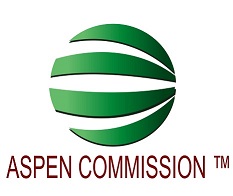ASPEN COMMISSION ™
THE CENTER FOR PHILOSOPHY POLITICS SPIRITUALITY AND SCIENCE ™
Government-to-government negotiations are the primary means of pursuing the key policy agendas of the United States. On a bilateral level, these discussions may deal with cooperative development and health projects such as PEPFAR (the President’s Emergency Plan for AIDS Relief) that require the buy-in of the host government. They also might stress the needs for host country to change existing laws and institutions to create a broader base for government or open doors for trade and exchanges. On a multilateral level, the U.S. seeks official agreement and support of host countries in international efforts to advance democracy, prevent the spread of nuclear weapons, counter the threats of terrorists and aggressive states, open world markets and communications, defend human rights, and increase investments regionally and globally to everyone’s advantage.
In developing cooperative programs, a key element in advancing U.S. policy is direct assistance. With the U.S. Agency for International Development (USAID), the Department of State works to improve food security and human health, reduce poverty, mitigate the impact of global climate change, and empower women and girls. The agency also helps countries like Haiti to recover from natural disasters and contributes to bringing peace and stability to Afghanistan, Iraq, and many other countries around the world.
|

World Markets
-- Teddy Roosevelt, 26th President of the United States of America
Aspen Commission ™ All Rights Reserved 1996-2025
IBS INTERNATIONAL BOARD OF STANDARDS
Aspen Commission Academy of International Relations, Philosphy Politics and Innovation - International Political Foregin Relations Public Policy Council. The Aspen Commission ™ is an Association Registered in Colorado and is also a listed as an Limited Company CO USA.
CEO Commission Join Mission Ethics Home Continuing Ed Government Jobs Awards Degrees Certification newspapers Diplomacy markets Links Careers Disclaimer
Accreditation and Recognition: GAFM * www.GAFM.org * www.CertifiedProjectManager.eu * www.AAFM.org * Certified Project Manager * Certified e-Commerce Consultant * Royal Law Society * Royal Business Society * Royal Business College * Royal Fellows * Royal Economics Academy * Oxford Law School * AAFM * Certified International Project Manager * www.GMentz.com * www.CertifiedProjectManager.org * www.GeorgeMentz.com * www.AAFM.us * www.icecc.com * www.reclaimingspirituality.com *